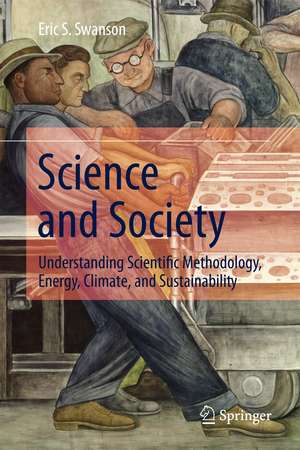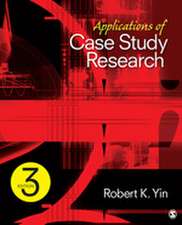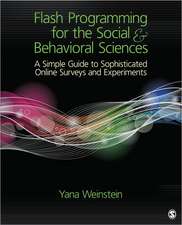Science and Society: Understanding Scientific Methodology, Energy, Climate, and Sustainability
Autor Eric S. Swansonen Limba Engleză Hardback – 5 oct 2015
With a narrative structure, Science and Society explains the scientific process and the power it brings to dealing with the natural world. The reader will gain a deeper understanding of scientific results reported by the media, and thus the tools to develop a rational, fact-based assessment of energy and resource policy.
Praise for Science and Society:
"Anyone who thinks society can be managed without science should think again, or better: read this book. Eric Swanson explains how science permeates society, and with simple examples of the scientific process he shows its special power in dealing with the natural world. This is a must read for the world's seven billion scientists."
F.E. Close, OBE, Oxford University, author of, among others, "Half-Life: The Divided Life of Bruno Pontecorvo, Physicist or Spy", "The Infinity Puzzle", and "Neutrino"
| Toate formatele și edițiile | Preț | Express |
|---|---|---|
| Paperback (1) | 388.90 lei 6-8 săpt. | |
| Springer International Publishing – 23 aug 2016 | 388.90 lei 6-8 săpt. | |
| Hardback (1) | 416.29 lei 38-44 zile | |
| Springer International Publishing – 5 oct 2015 | 416.29 lei 38-44 zile |
Preț: 416.29 lei
Preț vechi: 513.94 lei
-19% Nou
Puncte Express: 624
Preț estimativ în valută:
79.68€ • 86.58$ • 66.98£
79.68€ • 86.58$ • 66.98£
Carte tipărită la comandă
Livrare economică 17-23 aprilie
Preluare comenzi: 021 569.72.76
Specificații
ISBN-13: 9783319219868
ISBN-10: 3319219863
Pagini: 276
Ilustrații: XXIX, 276 p.
Dimensiuni: 155 x 235 x 20 mm
Greutate: 0.73 kg
Ediția:1st ed. 2016
Editura: Springer International Publishing
Colecția Springer
Locul publicării:Cham, Switzerland
ISBN-10: 3319219863
Pagini: 276
Ilustrații: XXIX, 276 p.
Dimensiuni: 155 x 235 x 20 mm
Greutate: 0.73 kg
Ediția:1st ed. 2016
Editura: Springer International Publishing
Colecția Springer
Locul publicării:Cham, Switzerland
Public țintă
Lower undergraduateCuprins
What is Science?.- Modes of Logic.- Modelling and Occam's Razor.- Theory, Model, and Law.- Defining Science.- Progress and Change in Science .- Answerable and Unanswerable in Science.- Why Does Science Exist?.- Doing Science.- The Beginnings of Science.- Studies.- Study Design.- Statistics and Studies.- Improving Study Reliability.- Pseudoscience.- Pseudoscience and Society.- Bad Science, Bad Scientists.- Case Studies.- Deconstructing Pseudoscience.- Energy and Entropy.- Definitions and Units.- Entropy.- Energy, Entropy, and Life.- Energy Flow in Society.- The Arrow of Time.- Electricity, Magnetism, and Light.- Magnetism and Force.- Electricity.- Faraday and Fields.- Maxwell and Light.- Vision and Light.- Measuring Light.- Spectral Lines.- Atom and Light.- The Electron.- Rutherford's Atom.- Blackbody Radiation.- The Photoelectric Effect.- Bohr's Atom.- The Quantum Atom.- Nuclear and Atomic Scales.- The Interaction of Light and Matter.- Climate.- Fossil Fuels.- Greenhouse Gases.- Energy Flow in the Environment.- Climate Modelling.- Implications of Climate Change.- Nuclear Energy and Radiation.- Into the Atom.- Nuclear Decay.- Nuclear Transmutation.- Health Effects of Radioactivity.- The Bomb.- Nuclear Power.- Nuclear Disasters.- Other Uses of Radioactivity.- Why Stars Shine.- A Finite Planet.- Population Growth.- Economic Growth.- Resource Management.- Beyond Carbon.- Electric Transport.- Outlook.- Space Travel.- Looking Out.
Notă biografică
Eric Swanson is a professor at the University of Pittsburgh. He has published more than 100 papers on theoretical hadronic physics, condensed matter physics, and biophysics. Swanson is a Fellow of the American Physical Society and is a founder of the APS Topical Group on Hadronic Physics. He has been a visiting scientist at Oxford University, TRIUMF in British Columbia, Jefferson Lab in Virginia, and Los Alamos National Laboratory.
Textul de pe ultima copertă
This undergraduate textbook educates non-science majors—our future policy makers—on how science works, the rules that underpin our existence, our impact on nature, and nature's impact on us. The book provides a concise, historically based, non-mathematical treatment of modern physics relevant to societal issues. It challenges readers to examine the problems we face (and their own beliefs) in light of the scientific method.
With a narrative structure, Science and Society explains the scientific process and the power it brings to dealing with the natural world. The reader will gain a deeper understanding of scientific results reported by the media, and thus the tools to develop a rational, fact-based assessment of energy and resource policy.
Praise for Science and Society:
"Anyone who thinks society can be managed without science should think again, or better: read this book. Eric Swanson explains how science permeates society, and with simple examples of the scientific process he shows its special power in dealing with the natural world. This is a must read for the world's seven billion scientists."
F.E. Close, OBE, Oxford University, author of, among others, "Half-Life: The Divided Life of Bruno Pontecorvo, Physicist or Spy", "The Infinity Puzzle", and "Neutrino"
With a narrative structure, Science and Society explains the scientific process and the power it brings to dealing with the natural world. The reader will gain a deeper understanding of scientific results reported by the media, and thus the tools to develop a rational, fact-based assessment of energy and resource policy.
Praise for Science and Society:
"Anyone who thinks society can be managed without science should think again, or better: read this book. Eric Swanson explains how science permeates society, and with simple examples of the scientific process he shows its special power in dealing with the natural world. This is a must read for the world's seven billion scientists."
F.E. Close, OBE, Oxford University, author of, among others, "Half-Life: The Divided Life of Bruno Pontecorvo, Physicist or Spy", "The Infinity Puzzle", and "Neutrino"
Caracteristici
Text is structured as a narrative with rich historical context and little mathematics The central ideas of modern physics are introduced in a non-mathematical, accessible, and historically motivated manner Covers many issues of current global interest, including climate change, pollution, population growth, nuclear power, renewable energy and the dangers of electromagnetic and nuclear radiation Students are challenged to question their own beliefs and to develop realistic fact-based worldviews Explains the differences between science and pseudoscience Includes supplementary material: sn.pub/extras














